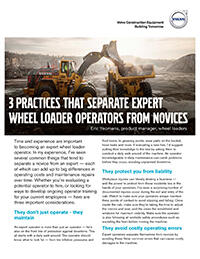3 Practices That Separate Expert Wheel Loader Operators from Novices

Time and experience are important to becoming an expert wheel loader operator. In my experience, I’ve seen several common things that tend to separate a novice from an expert — each of which can add up to big differences in operating costs and maintenance repairs over time. Whether you’re evaluating a potential operator to hire, or looking for ways to develop ongoing operator training for your current employees — here are three important considerations.
1. They don’t just operate – they maintain
An expert operator is more than just an operator — he’s also on the front line of protection against downtime. This all starts with a daily walk-around. The operator should know what to look for — from tire inflation pressures and fluid levels, to greasing points, wear parts on the bucket, hose leaks and more. If evaluating a new hire, I’d suggest putting their knowledge to the test by asking them to conduct a daily walk-around of the machine. An operator knowledgeable in daily maintenance can catch problems before they occur, avoiding unplanned downtime.
2. They protect you from liability
Workplace injuries can literally destroy a business — and the power to protect from those incidents lies in the hands of your operators. I’ve seen a surprising number of documented injuries occur during the exit and entry of the cab. Watch to make sure your operators always maintain three points of contact to avoid slipping and falling. Once inside the cab, make sure they’re taking the time to adjust the mirrors and seat, and the clean the windshield and windows for maximum visibility. Make sure the operator is also following all worksite safety procedures such as sounding the horn before moving the machine.
3. They avoid costly operating errors
Expert operators separate themselves from novices by avoiding these three common errors that can cause costly damages to the machine.
- Hot turbo shutdowns. When an operator doesn’t idle the machine for 2-3 minutes prior to shutting the engine down, it can be hard on the turbocharger over time, and can even result in turbocharger failures. Avoiding this repair can save between $1,000 and $5,000, depending on the machine.
- Riding the brakes. I see a lot of operators who tend to rest their foot on the brake pedal — or often throttle high to speed up to the pile and then slam on the brakes when they get there. It’s much more fuel efficient and easier on the brakes to simply run in a lower gear.
 High-speed shifts. Operators should always bring the wheel loader to a complete stop before shifting it from reverse to forward or vice versa. And while some loaders have features to help avoid this — such as Volvo Reverse-by-Braking – shifting without coming to a complete stop over a long period of time can lead to eventual driveline failure. The replacement of the transmission can cost roughly $20,000. Reducing high-speed shifts can help avoid that.
High-speed shifts. Operators should always bring the wheel loader to a complete stop before shifting it from reverse to forward or vice versa. And while some loaders have features to help avoid this — such as Volvo Reverse-by-Braking – shifting without coming to a complete stop over a long period of time can lead to eventual driveline failure. The replacement of the transmission can cost roughly $20,000. Reducing high-speed shifts can help avoid that.
After 40 years in the industry, these are three of the most important takeaways I have for wheel loader operators — but there are so many more. From bucket selection to best practices for digging into a pile and positioning the truck — operator behavior has a huge impact on uptime and productivity. To learn more, I’d suggest looking at our certified operator training program.